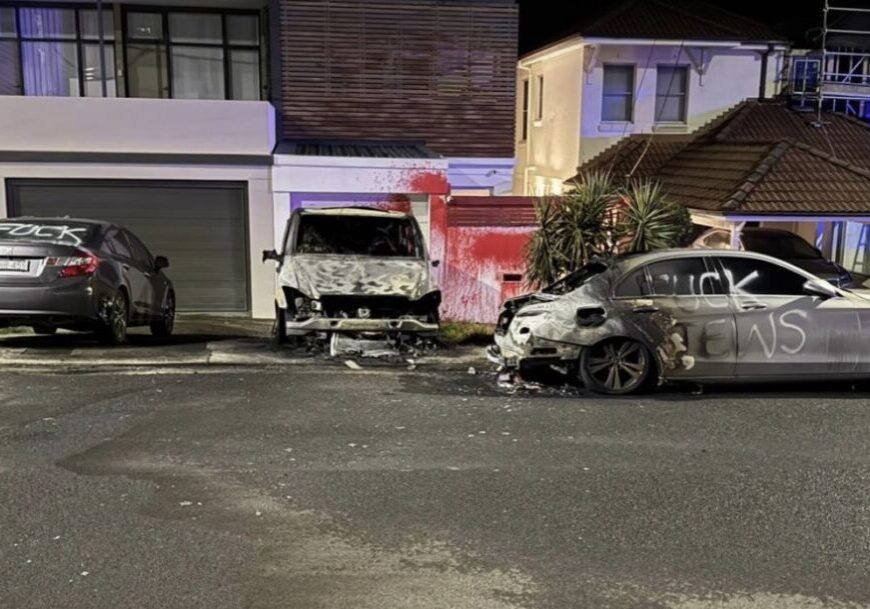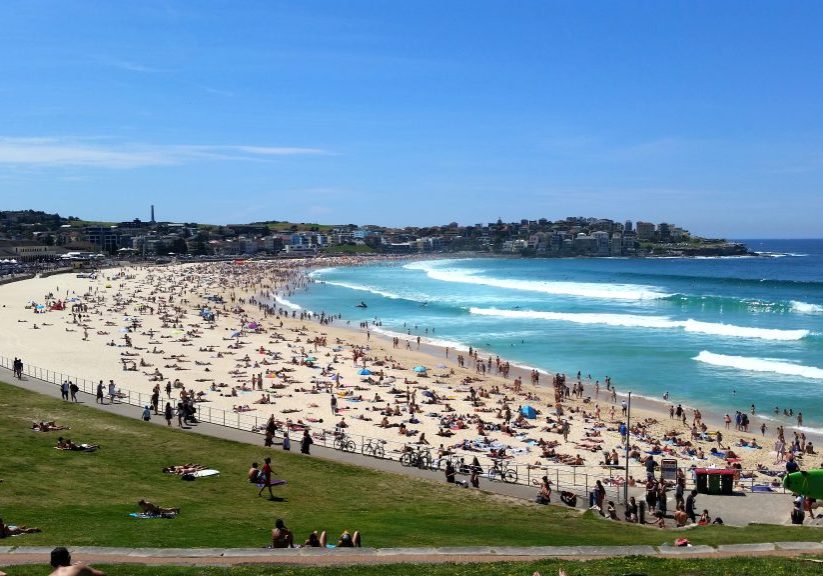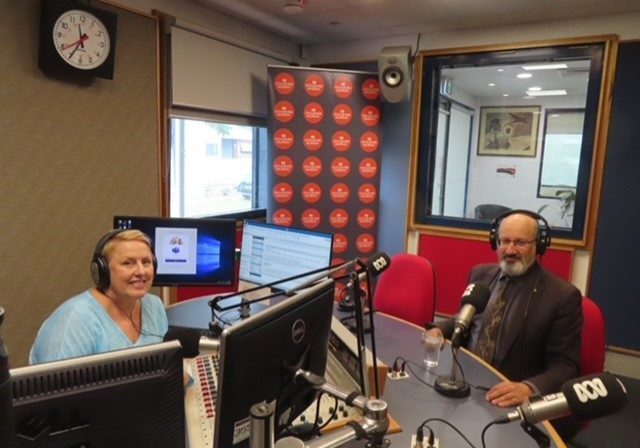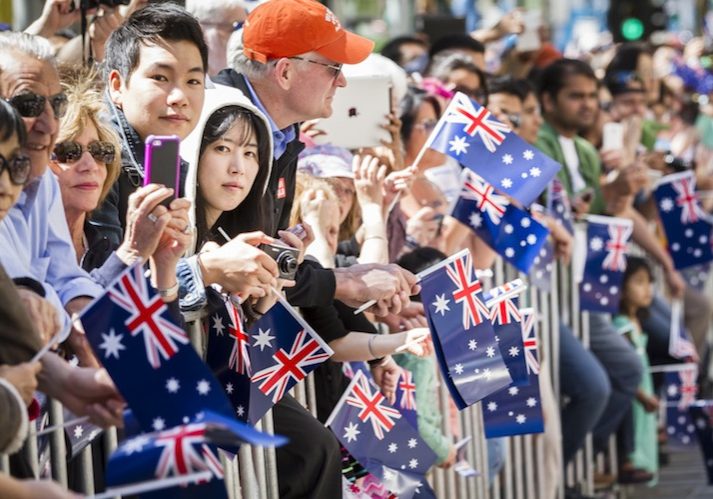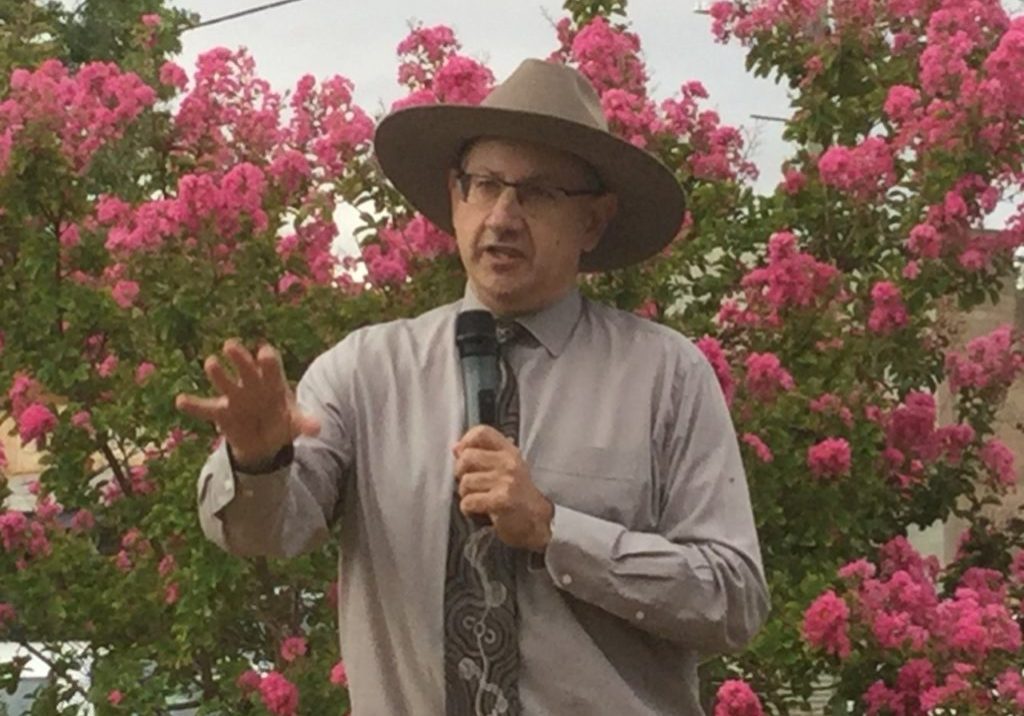Australia/Israel Review
All Quiet on the Baghdad Front
Nov 1, 2005 | External author
When Iraqis went to the polls
By Michael Yon
I was in Baquba during Iraq’s January elections, having hitched a ride with the US Army to a polling site. There were bombs exploding, mortars falling, and hot machine guns. The fact that the voting was going great despite the violence was something few people expected. Until that day, I’d been sceptical about Iraq. Not fashionably cynical, merely sceptical. We could all hear what President Bush, Prime Minister Blair, and other elected leaders were saying, but they are politicians. We could also hear the end-of-the-Iraqi-world predictions by so many others. But nobody really knew what the Iraqi people had in mind, and the Iraqis were the people who counted most.
The millions who voted sent a message: Serpentine lines of ebullient Iraqis risked their lives — dozens died — to have a say in their futures. People who voted dipped their right index fingers into purple ink and cast their ballots. The image of Iraqis proudly holding their stained fingers aloft became a symbol for the success of the election. In Baquba, many voters asked me to photograph them as they left the polling places, all smiles and purple fingers.
The courage of the Iraqi people that January day planted a seed of confidence. There I was: an American alone in a dangerous Iraqi city, at the very polling site that soldiers were wagering would be bombed. One after another, Iraqis came and shook my hand, showing me their children, laughing, smiling, saying over and over, “Thank you, thank you, thank you.” I felt like an honoured guest, and I felt a twinge of shame that I’d been less confident in the Iraqis than they were in themselves. The voice of the Iraqi people had risen above the clamour of insurgent violence.
But that was hardly the end of the story. Soon came reports that insurgents were targeting people with purple fingers. And in the months since, terrorists have murdered thousands more Iraqis, and hundreds of coalition soldiers. With Iraqis due to return to the polls for a referendum on their new constitution, I wondered which was stronger: the terror or the hope. Would the Iraqi people speak with softer and more tentative voices now after the slaughter of thousands?
For a variety of reasons, I decided the place to be on election day was alongside Command Sergeant Major Jeffrey Mellinger, the top enlisted man for coalition forces in Iraq and right-hand man to General George W. Casey, himself the US commander in Iraq. I’d spent three weeks with Mellinger earlier in the year, driving around Iraq, down to Kuwait, then flying over the Arabian Gulf to ships and oil platforms. I knew that wherever he was, Mellinger would be where things were happening.
We reconnected at Camp Victory, Baghdad, on October 10, the Monday before the voting. Two Blackhawks deposited me on Griffin Field. We drove to link up with Mellinger and some Military Police (MPs) who were working with Iraqi police. Thousands of details needed attention before the voting. Junked and blown-up cars and other debris needed to be removed from roadsides to reduce the bomb threat. Weapons were being cleaned, and radios checked.
Mellinger and crew were going into Baghdad with the 393rd Infantry Regiment, 1st Battalion, 2nd Brigade, 75th Division, from Fort Chaffee, Arkansas. They train the Iraqi police, the “IP.”
Iraqi police have been taking an awful beating at the checkpoints from bomb and sniper attacks. The insurgents sometimes rig cars similar to the one used by the Washington, DC, snipers, where the kid hid and fired his rifle through a hole in the trunk while the man drove. Sometimes they will make the hole in the door, and the shooter will lie on the rear floor and take aim. The car might pause a moment on an overpass, and then take a shot at Iraqi or American forces. They do it all the time: Drive-by shootings are daily occurrences that, unlike the many checkpoints devastated by car bombs, rarely make the news.
One Iraqi police commander at the checkpoint talked about the enemy’s taste in vehicles. Opels make good car bombs because they are cheap, but Mercedes and BMWs are great for drive-by shootings or fast attacks. Nobody can catch them. Plus, he said, the terrorists like to look cool.
After the first four checkpoints, we stopped at the old Kuwaiti Embassy, which apparently never reopened after Saddam plundered Kuwait. The place was in awful disrepair. An American sergeant kindly gave me a tour, asking if I would like to meet a police commander. “Definitely,” I said. The sergeant apologised to the Iraqi police commander for not announcing in advance, but the commander smiled in welcome and offered us seats. I wanted to get straight to the negatives, so I asked him what was wrong, and what would make his job go better. I expected the answer to be “radios and armour,” as it is in Mosul. But this commander said he needed his building refurbished.
“Are you saying communications and armour are not a problem?” I could hardly believe it, thinking he might be one of those chiefs who looks out for himself more than his men. But the American sergeant affirmed that the Iraqi police in this battalion have body armour and helmets. They are also getting new armoured vehicles called ASVs, which the sergeant explained are much better than the armoured Humvees his men use. The police commander showed me a photo of the ASVs, and he seemed satisfied. All he wanted was a better building.
On the day before the referendum, I accompanied Mellinger and his security crew to Taji, to inspect Phoenix Academy, a training facility for American soldiers coming to Iraq. On the drive out of Baghdad, the streets were spooky quiet. Baghdad seemed almost deserted. Traffic had been locked down for the next day’s voting. Iraqi police were manning checkpoints into Baghdad, searching every vehicle. The sound of car bombs that had been rumbling across Baghdad every day since I returned was now all but gone.
Once we started out, we’d have no idea how long we might be away, so I headed as quickly as possible to my room, showered, and managed to fall asleep. While I slept, terrorists knocked out electricity to most of Baghdad. Iraqis pulled out their lanterns.
I walked through the morning darkness to meet the soldiers, who were laughing at the terrorists: “Don’t those dumbasses know that the voting will happen during the daytime?” When it comes to winning hearts and minds, cutting off the electricity didn’t win any support. I have been saying it for many months: The terrorists are losing. But today was litmus-day.
We met with four Humvees full of soldiers from the 42nd MP Brigade from Fort Lewis, Washington, most of whom seemed to expect combat, or at least an encounter with an improvised explosive device (IED) or a car bomb. During the pre-mission briefing, the command sergeant major of the 42nd MPs warned about an “old lady beggar bomb.” The terrorists have delivered bombs in the strangest ways: There’s the dead-dog bomb, the dead-donkey bomb, the dead-horse bomb, the bomb in the water main, the bomb under the overpass, the one on the electric pole, and even the one in the soccer ball. The soldiers laughed, as did their sergeant, who nonetheless said, “Now don’t go shooting little old ladies. If you see an old beggar lady, just don’t let her get close.”
Security demanded practically no cars on the road, although about 200 drivers had been issued special placards, allowing them to conduct official business in their vehicles. Anyone driving without the placard would be detained by the Iraqi police.
At 6:25 am there was a big explosion in the distance.
We loaded into six Humvees and at 6:42 we stopped just before the main gate, and the soldiers piled out from the Humvees and “went red”: loaded their weapons. We rolled into Baghdad.
The voting started at 7:00. At 7:16, our caravan of six Humvees came to a halt when a man who appeared to be drunk or stoned stumbled into the road. But then the news came into the headset that this man is often drunk here. He staggered to a stop in the middle of the road and pulled down his pants. Some soldiers got out and the interpreter tackled him.
A few minutes later we stopped a car that had no placard displayed, but it turned out to be an Iraqi soldier, out of uniform, delivering food to other soldiers.
At 8:00 we checked an American MP post where the soldiers were sleeping on cots on dirt floors in a dilapidated cinder building, sharing two Porto-lets. These MPs were in a neutral zone between an Iraqi police station and an Iraqi army station. As is common, the Iraqi police and Iraqi soldiers were not talking with each other. The fact that the army pays more than the police is causing great animosity not just here, but across Iraq.
On our way back through town, we started to notice competition for the mostly deserted streets. Along the way there were flocks of kids who’d claimed the open roads for soccer fields. At one point, there were four lanes of soccer matches, stretching for maybe half a mile, prompting one soldier to remark, “It’s like the world’s largest soccer game.”
It was quiet. There were no reports of attacks. By 10:30, we’d visited other places and still there was no enemy activity. Apart from that one explosion at 6:25, I had not heard a shot fired, and no casualties were being reported. It was bizarre.
At 11:15, we visited Michigan National Guard serving as the 720th MPs. Their area of operations was all of Sadr City, the vast slum that houses more than half of Baghdad’s six million or so people. Many Americans have died in Sadr City. Sergeant First Class Robert Stewart showed Mellinger the giant map of Sadr City, and there was only a single sticker. “Rock throwing,” it said.
In the January election, the stickers on that map might have looked like fish scales. Stewart said that “the ISF [Iraqi Security Forces] are running the entire show. Their ability to protect themselves since January has increased one thousand fold.” There were so many voters that they were having problems managing the lines.
I spoke with Major Kadhum Shakir, the Sadr City traffic police assistant commander. He was confident, and said through the interpreter, “Iraqi people hope constitution pass.” He said that most of the people in Sadr City would vote because the Shi’a religious leadership in Najaf had told them to vote, but did not tell them how to vote. Major Kadhum said that he believes Iraq will get better leadership, and that the voting was going much better than in January.
I then spoke with Major Yayha Rasuruh from the Iraqi army, who is charged with securing the 46th Sector of Sadr City. He said he took all 50 of his soldiers to vote, and he showed his purple finger proudly. “I think this is great time Iraq passes through. Thirty-five years we suffer. There is freedom now.” We talked for about ten minutes, and I asked what it was like to vote. Major Yayha said that the voting worker made him fold his ballot before sticking it in the box. I laughed and said, “The worker was brave. He told an army major to fold his paper!”
Major Yayha laughed. “Yes, no longer afraid to talk with police or army. This is good change.” The moment was warm and fuzzy, but the true situation is not. There is little doubt that the people are getting more confident in their new world, but the undercurrent is still Jungle Law.
At 12:10, we arrived at a voting station in Sadr City.
One young Iraqi policeman was hungry and irritable; apparently nobody had brought them food. The American soldiers were dealing with that while I talked with Iraqis. American forces were not supposed to go into the polling stations, but I am not a soldier. Mellinger said he would give me 10 minutes, and one soldier volunteered to go with me just in case.
Inside the polling place was empty except for the workers. I asked to photograph, but they did not permit it, so I asked to see the boss, and he firmly but politely said, “No, is against rules.” He was pleasant and agreed to talk but did not want to give his name, saying that he was in charge of nine polling sites, and that 2,500 people were registered at each site. At this site, which was a girls’ high school — most polling sites are schools — about 1,500 people had already voted. The supervisor said that the people had formed a large line at about 6:00 am, an hour before the polls opened. He expected that Ramadan had decreased the number of voters, but 1,500 of 2,500 is an impressive turnout. The soldier, the interpreter, and I left the polling station and walked out front.
We stopped at another station, and met Minnesota National Guard soldiers, also serving now as 720th MPs. Captain Aaron Krenz said their responsibilities included the Karrada and al-Madaan districts, and 119 polling sites. All was quiet, but unlike in Sadr City, where the people had formed long lines before the polls opened, in these polling sites many people waited until afternoon.
The Minnesota National Guardsmen, who might have been in pitched combat if this were January, were lounging about in lawn chairs, wearing full kit, ready to fight if the Iraqis needed help. But no calls were coming. Apparently the only help anyone needed was for lunch delivery.
We left, drove here and there, and landed at a different unit: the 170th MPs from Fort Lewis. This unit was responsible for supporting 20 polling stations. Sergeant First Class Dilbert French mentioned some minor SIGACTS that were not worth jotting down. (SIGACT is military jargon for significant action; anything that significantly affects friendly or enemy forces.) “Is it like this all over Iraq?” I asked. I could hardly believe it. Where are the mortars? The IEDs? The homicide bombers and car bombs? No snipers? Surely the ground must be shaking in Falluja or Ramadi, and what about Mosul, Baquba, and Basra? What about Tal Afar? French checked the secure computer for all of Iraq. The whole country looked quiet. “The media is going to be very disappointed,” chuckled one soldier, and I laughed along with him.
Next morning, I got information from the Army that there had been 19 attacks on polling sites throughout Iraq, and in January there had been 108. There may be some garble in the numbers (there usually is). There had actually been somewhere between 300 and 350 total attacks on the January election day. And the army would later say that there were 89 total attacks during the voting last week. Who knows? I know that it was quiet from my perch, and that the guns had been silenced long enough that we could hear the Iraqi voice speak for a second time. The voice was louder, stronger, and prouder than it had been in January.
Michael Yon, author of Danger Close, is an independent writer working in Iraq. His dispatches can be read at michaelyon.blogspot.com. © Weekly Standard, reprinted by permission, all rights reserved.

